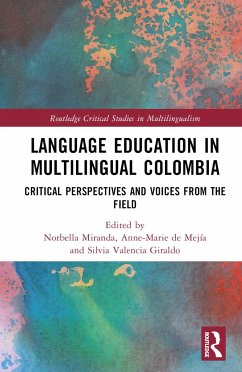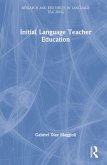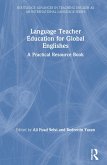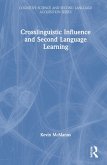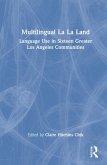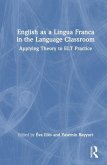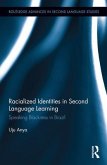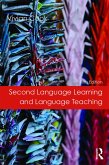Language Education in Multilingual Colombia
Critical Perspectives and Voices from the Field
Herausgeber: Miranda, Norbella; Giraldo, Silvia Valencia; de Mejía, Anne-Marie
Language Education in Multilingual Colombia
Critical Perspectives and Voices from the Field
Herausgeber: Miranda, Norbella; Giraldo, Silvia Valencia; de Mejía, Anne-Marie
- Gebundenes Buch
- Merkliste
- Auf die Merkliste
- Bewerten Bewerten
- Teilen
- Produkt teilen
- Produkterinnerung
- Produkterinnerung
This collection brings together cutting-edge research and theoretical discussions on the linguistic, cultural, and political forces that shape multilingual Colombia, highlighting the country's unique sociolinguistic landscape and offering new insights into multilingualism in the Global South.
Andere Kunden interessierten sich auch für
![Initial Language Teacher Education Initial Language Teacher Education]() Gabriel Díaz MaggioliInitial Language Teacher Education191,99 €
Gabriel Díaz MaggioliInitial Language Teacher Education191,99 €![Language Teacher Education for Global Englishes Language Teacher Education for Global Englishes]() Language Teacher Education for Global Englishes191,99 €
Language Teacher Education for Global Englishes191,99 €![Crosslinguistic Influence and Second Language Learning Crosslinguistic Influence and Second Language Learning]() Kevin McManusCrosslinguistic Influence and Second Language Learning191,99 €
Kevin McManusCrosslinguistic Influence and Second Language Learning191,99 €![Multilingual La La Land Multilingual La La Land]() Multilingual La La Land191,99 €
Multilingual La La Land191,99 €![English as a Lingua Franca in the Language Classroom English as a Lingua Franca in the Language Classroom]() English as a Lingua Franca in the Language Classroom190,99 €
English as a Lingua Franca in the Language Classroom190,99 €![Racialized Identities in Second Language Learning Racialized Identities in Second Language Learning]() Uju AnyaRacialized Identities in Second Language Learning202,99 €
Uju AnyaRacialized Identities in Second Language Learning202,99 €![Second Language Learning and Language Teaching Second Language Learning and Language Teaching]() Vivian CookSecond Language Learning and Language Teaching212,99 €
Vivian CookSecond Language Learning and Language Teaching212,99 €-
-
-
This collection brings together cutting-edge research and theoretical discussions on the linguistic, cultural, and political forces that shape multilingual Colombia, highlighting the country's unique sociolinguistic landscape and offering new insights into multilingualism in the Global South.
Produktdetails
- Produktdetails
- Verlag: Taylor & Francis Ltd (Sales)
- Seitenzahl: 318
- Erscheinungstermin: 4. August 2022
- Englisch
- Abmessung: 229mm x 152mm x 19mm
- Gewicht: 608g
- ISBN-13: 9780367725495
- ISBN-10: 0367725495
- Artikelnr.: 63658108
- Verlag: Taylor & Francis Ltd (Sales)
- Seitenzahl: 318
- Erscheinungstermin: 4. August 2022
- Englisch
- Abmessung: 229mm x 152mm x 19mm
- Gewicht: 608g
- ISBN-13: 9780367725495
- ISBN-10: 0367725495
- Artikelnr.: 63658108
Norbella Miranda is Assistant Professor in the School of Language Sciences at Universidad del Valle, Cali, Colombia. She holds a PhD in Educational Sciences from Universidad del Quindiìo, Armenia, Colombia. Her research and publications focus on educational language policies, bi/multilingualism and curriculum development for language education. She is a member of the EILA research group (Equipo de Investigación en Lingüística Aplicada) of Universidad del Valle. Her publications include: Appropriation of Colombian ELT policy in a targeted school: The creation of an "elite" yet still needy school in the public education system (book chapter, Routledge, 2021). Anne-Marie de Mejía is Professor in the area of Bilingualism and Bilingual Education at the School of Education at Universidad de los Andes, Bogotá. She holds a Ph.D in Linguistics from Lancaster University, U.K. Her research interests include teacher empowerment, interculturality, language and education policy, and bilingual teacher development. Silvia Valencia Giraldo is Professor in the area of Sociolinguistics and Bilingualism in the School of Education at Universidad del Quindiìo, Armenia, Colombia. She received her Ph.D from the University of Wales, Aberystwyth, UK., in the area of bilingualism. Her research interests include bilingual classroom interaction, language policy, and literacy.
Contents
List of illustrations
Acknowledgements
Critical perspectives on language education in multilingual Colombia: An
introduction ANNE-MARIE DE MEJÍA, SILVIA VALENCIA GIRALDO AND NORBELLA
MIRANDA
1. Multilingual Colombia: Dimensions of linguistic and cultural
diversity
SILVIA VALENCIA GIRALDO, NORBELLA MIRANDA AND ANNE-MARIE DE MEJÍA
SECTION I
Creole and Indigenous Languages in Colombia
Decolonizing multilingual practices: Lessons from Colombia
MARIO E. LÓPEZ-GOPAR
2. Preserving the Creole language of the Caribbean archipelago of San
Andrés and Providence: An ecolinguistic approach to multilingualism
in Colombia
RAQUEL SANMIGUEL ARDILA
3. Between chants, games and elders (Andi Kanto, jarocheria ku tata ri
mae mi). Local strategies for the strengthening of the Palenquero
language among young people in San Basilio de Palenque
(Bolívar-Colombia)
LUIS RICARDO NAVARRO DÍAZ, SEBASTIÁN SALGADO REYES AND RODOLFO
PALOMINO CASSIANI
4. Colombia on the path of linguistic revitalization. Some thoughts from
Cauca
LILIA TRIVIÑO GARZÓN AND TULIO ROJAS CURIEUX
SECTION II
Language education policy: Discourses, ideologies and local practices
Marginalizing discourses and teacher resilience in Colombian language
policy and education
DAVID CASSELS JOHNSON
5. English in education policy in Colombia: Two decades of policy
discourse and appropriation
NORBELLA MIRANDA AND SILVIA VALENCIA GIRALDO
6. English language teaching in rural Colombia amidst the armed
conflict: A case study of teacher positioning vis-à-vis policy,
practice and the profession
FERNEY CRUZ ARCILA
7. Late capitalism and the commodification of English in Colombia: The
shaping of language education policy and practice
YECID ORTEGA
8. Colombian teachers of English as agents in the implementation of
English language policies in a multilingual country: Villains or
heroes?
ADRIANA GONZÁLEZ
SECTION III
Interculturality and pedagogy
Interculturality in languages and cultures education
ANTHONY J. LIDDICOAT
9. Transemiotizing and re-sourcing resources in language education:
Towards a multimodal social semiotic perspective on intercultural
communication
JOSÉ ALDEMAR ÁLVAREZ VALENCIA
10. Building intercultural language education in Colombia: Insights from
research with English language teachers
BEATRIZ PEÑA DIX
11. Focusing on dimensions of interculturality in the context of language
teacher education: Insights from a case study in Colombia
ISABEL TEJADA-SÁNCHEZ AND ANNE MARIE DE MEJÍA
SECTION IV
Reimagining teacher education: Taking account of diversities and
inequalities
Decolonizing and decentering language teacher education in
Multilingual Colombia
JUDY SHARKEY
12. Nurturing language teacher education in Colombia from a multilingual
perspective
FANNY HERNÁNDEZ GAVIRIA AND MARTHA BERDUGO-TORRES
13. Contesting the hegemony of English in a country declared to be
multilingual: The outcome of research with English language teachers
in an in-service program
CARMEN HELENA GUERRERO NIETO AND ÁLVARO QUINTERO-POLO
14. Crossing linguistic boundaries with community literacies: A
collaborative, place-based ethnography in two urban localities in
Bogotá
AMPARO CLAVIJO-OLARTE AND THERESA Y. AUSTIN
15. Views on writing and pedagogic practices: A systematic review of the
research literature on bilingual (Spanish/English) teaching in
Colombia
NEIRA LOAIZA VILLALBA AND CLAUDIA ORTIZ RUIZ
Afterword: Decolonizing Multilingual Colombia
NANCY H. HORNBERGER
Contributors
List of illustrations
Acknowledgements
Critical perspectives on language education in multilingual Colombia: An
introduction ANNE-MARIE DE MEJÍA, SILVIA VALENCIA GIRALDO AND NORBELLA
MIRANDA
1. Multilingual Colombia: Dimensions of linguistic and cultural
diversity
SILVIA VALENCIA GIRALDO, NORBELLA MIRANDA AND ANNE-MARIE DE MEJÍA
SECTION I
Creole and Indigenous Languages in Colombia
Decolonizing multilingual practices: Lessons from Colombia
MARIO E. LÓPEZ-GOPAR
2. Preserving the Creole language of the Caribbean archipelago of San
Andrés and Providence: An ecolinguistic approach to multilingualism
in Colombia
RAQUEL SANMIGUEL ARDILA
3. Between chants, games and elders (Andi Kanto, jarocheria ku tata ri
mae mi). Local strategies for the strengthening of the Palenquero
language among young people in San Basilio de Palenque
(Bolívar-Colombia)
LUIS RICARDO NAVARRO DÍAZ, SEBASTIÁN SALGADO REYES AND RODOLFO
PALOMINO CASSIANI
4. Colombia on the path of linguistic revitalization. Some thoughts from
Cauca
LILIA TRIVIÑO GARZÓN AND TULIO ROJAS CURIEUX
SECTION II
Language education policy: Discourses, ideologies and local practices
Marginalizing discourses and teacher resilience in Colombian language
policy and education
DAVID CASSELS JOHNSON
5. English in education policy in Colombia: Two decades of policy
discourse and appropriation
NORBELLA MIRANDA AND SILVIA VALENCIA GIRALDO
6. English language teaching in rural Colombia amidst the armed
conflict: A case study of teacher positioning vis-à-vis policy,
practice and the profession
FERNEY CRUZ ARCILA
7. Late capitalism and the commodification of English in Colombia: The
shaping of language education policy and practice
YECID ORTEGA
8. Colombian teachers of English as agents in the implementation of
English language policies in a multilingual country: Villains or
heroes?
ADRIANA GONZÁLEZ
SECTION III
Interculturality and pedagogy
Interculturality in languages and cultures education
ANTHONY J. LIDDICOAT
9. Transemiotizing and re-sourcing resources in language education:
Towards a multimodal social semiotic perspective on intercultural
communication
JOSÉ ALDEMAR ÁLVAREZ VALENCIA
10. Building intercultural language education in Colombia: Insights from
research with English language teachers
BEATRIZ PEÑA DIX
11. Focusing on dimensions of interculturality in the context of language
teacher education: Insights from a case study in Colombia
ISABEL TEJADA-SÁNCHEZ AND ANNE MARIE DE MEJÍA
SECTION IV
Reimagining teacher education: Taking account of diversities and
inequalities
Decolonizing and decentering language teacher education in
Multilingual Colombia
JUDY SHARKEY
12. Nurturing language teacher education in Colombia from a multilingual
perspective
FANNY HERNÁNDEZ GAVIRIA AND MARTHA BERDUGO-TORRES
13. Contesting the hegemony of English in a country declared to be
multilingual: The outcome of research with English language teachers
in an in-service program
CARMEN HELENA GUERRERO NIETO AND ÁLVARO QUINTERO-POLO
14. Crossing linguistic boundaries with community literacies: A
collaborative, place-based ethnography in two urban localities in
Bogotá
AMPARO CLAVIJO-OLARTE AND THERESA Y. AUSTIN
15. Views on writing and pedagogic practices: A systematic review of the
research literature on bilingual (Spanish/English) teaching in
Colombia
NEIRA LOAIZA VILLALBA AND CLAUDIA ORTIZ RUIZ
Afterword: Decolonizing Multilingual Colombia
NANCY H. HORNBERGER
Contributors
Contents
List of illustrations
Acknowledgements
Critical perspectives on language education in multilingual Colombia: An
introduction ANNE-MARIE DE MEJÍA, SILVIA VALENCIA GIRALDO AND NORBELLA
MIRANDA
1. Multilingual Colombia: Dimensions of linguistic and cultural
diversity
SILVIA VALENCIA GIRALDO, NORBELLA MIRANDA AND ANNE-MARIE DE MEJÍA
SECTION I
Creole and Indigenous Languages in Colombia
Decolonizing multilingual practices: Lessons from Colombia
MARIO E. LÓPEZ-GOPAR
2. Preserving the Creole language of the Caribbean archipelago of San
Andrés and Providence: An ecolinguistic approach to multilingualism
in Colombia
RAQUEL SANMIGUEL ARDILA
3. Between chants, games and elders (Andi Kanto, jarocheria ku tata ri
mae mi). Local strategies for the strengthening of the Palenquero
language among young people in San Basilio de Palenque
(Bolívar-Colombia)
LUIS RICARDO NAVARRO DÍAZ, SEBASTIÁN SALGADO REYES AND RODOLFO
PALOMINO CASSIANI
4. Colombia on the path of linguistic revitalization. Some thoughts from
Cauca
LILIA TRIVIÑO GARZÓN AND TULIO ROJAS CURIEUX
SECTION II
Language education policy: Discourses, ideologies and local practices
Marginalizing discourses and teacher resilience in Colombian language
policy and education
DAVID CASSELS JOHNSON
5. English in education policy in Colombia: Two decades of policy
discourse and appropriation
NORBELLA MIRANDA AND SILVIA VALENCIA GIRALDO
6. English language teaching in rural Colombia amidst the armed
conflict: A case study of teacher positioning vis-à-vis policy,
practice and the profession
FERNEY CRUZ ARCILA
7. Late capitalism and the commodification of English in Colombia: The
shaping of language education policy and practice
YECID ORTEGA
8. Colombian teachers of English as agents in the implementation of
English language policies in a multilingual country: Villains or
heroes?
ADRIANA GONZÁLEZ
SECTION III
Interculturality and pedagogy
Interculturality in languages and cultures education
ANTHONY J. LIDDICOAT
9. Transemiotizing and re-sourcing resources in language education:
Towards a multimodal social semiotic perspective on intercultural
communication
JOSÉ ALDEMAR ÁLVAREZ VALENCIA
10. Building intercultural language education in Colombia: Insights from
research with English language teachers
BEATRIZ PEÑA DIX
11. Focusing on dimensions of interculturality in the context of language
teacher education: Insights from a case study in Colombia
ISABEL TEJADA-SÁNCHEZ AND ANNE MARIE DE MEJÍA
SECTION IV
Reimagining teacher education: Taking account of diversities and
inequalities
Decolonizing and decentering language teacher education in
Multilingual Colombia
JUDY SHARKEY
12. Nurturing language teacher education in Colombia from a multilingual
perspective
FANNY HERNÁNDEZ GAVIRIA AND MARTHA BERDUGO-TORRES
13. Contesting the hegemony of English in a country declared to be
multilingual: The outcome of research with English language teachers
in an in-service program
CARMEN HELENA GUERRERO NIETO AND ÁLVARO QUINTERO-POLO
14. Crossing linguistic boundaries with community literacies: A
collaborative, place-based ethnography in two urban localities in
Bogotá
AMPARO CLAVIJO-OLARTE AND THERESA Y. AUSTIN
15. Views on writing and pedagogic practices: A systematic review of the
research literature on bilingual (Spanish/English) teaching in
Colombia
NEIRA LOAIZA VILLALBA AND CLAUDIA ORTIZ RUIZ
Afterword: Decolonizing Multilingual Colombia
NANCY H. HORNBERGER
Contributors
List of illustrations
Acknowledgements
Critical perspectives on language education in multilingual Colombia: An
introduction ANNE-MARIE DE MEJÍA, SILVIA VALENCIA GIRALDO AND NORBELLA
MIRANDA
1. Multilingual Colombia: Dimensions of linguistic and cultural
diversity
SILVIA VALENCIA GIRALDO, NORBELLA MIRANDA AND ANNE-MARIE DE MEJÍA
SECTION I
Creole and Indigenous Languages in Colombia
Decolonizing multilingual practices: Lessons from Colombia
MARIO E. LÓPEZ-GOPAR
2. Preserving the Creole language of the Caribbean archipelago of San
Andrés and Providence: An ecolinguistic approach to multilingualism
in Colombia
RAQUEL SANMIGUEL ARDILA
3. Between chants, games and elders (Andi Kanto, jarocheria ku tata ri
mae mi). Local strategies for the strengthening of the Palenquero
language among young people in San Basilio de Palenque
(Bolívar-Colombia)
LUIS RICARDO NAVARRO DÍAZ, SEBASTIÁN SALGADO REYES AND RODOLFO
PALOMINO CASSIANI
4. Colombia on the path of linguistic revitalization. Some thoughts from
Cauca
LILIA TRIVIÑO GARZÓN AND TULIO ROJAS CURIEUX
SECTION II
Language education policy: Discourses, ideologies and local practices
Marginalizing discourses and teacher resilience in Colombian language
policy and education
DAVID CASSELS JOHNSON
5. English in education policy in Colombia: Two decades of policy
discourse and appropriation
NORBELLA MIRANDA AND SILVIA VALENCIA GIRALDO
6. English language teaching in rural Colombia amidst the armed
conflict: A case study of teacher positioning vis-à-vis policy,
practice and the profession
FERNEY CRUZ ARCILA
7. Late capitalism and the commodification of English in Colombia: The
shaping of language education policy and practice
YECID ORTEGA
8. Colombian teachers of English as agents in the implementation of
English language policies in a multilingual country: Villains or
heroes?
ADRIANA GONZÁLEZ
SECTION III
Interculturality and pedagogy
Interculturality in languages and cultures education
ANTHONY J. LIDDICOAT
9. Transemiotizing and re-sourcing resources in language education:
Towards a multimodal social semiotic perspective on intercultural
communication
JOSÉ ALDEMAR ÁLVAREZ VALENCIA
10. Building intercultural language education in Colombia: Insights from
research with English language teachers
BEATRIZ PEÑA DIX
11. Focusing on dimensions of interculturality in the context of language
teacher education: Insights from a case study in Colombia
ISABEL TEJADA-SÁNCHEZ AND ANNE MARIE DE MEJÍA
SECTION IV
Reimagining teacher education: Taking account of diversities and
inequalities
Decolonizing and decentering language teacher education in
Multilingual Colombia
JUDY SHARKEY
12. Nurturing language teacher education in Colombia from a multilingual
perspective
FANNY HERNÁNDEZ GAVIRIA AND MARTHA BERDUGO-TORRES
13. Contesting the hegemony of English in a country declared to be
multilingual: The outcome of research with English language teachers
in an in-service program
CARMEN HELENA GUERRERO NIETO AND ÁLVARO QUINTERO-POLO
14. Crossing linguistic boundaries with community literacies: A
collaborative, place-based ethnography in two urban localities in
Bogotá
AMPARO CLAVIJO-OLARTE AND THERESA Y. AUSTIN
15. Views on writing and pedagogic practices: A systematic review of the
research literature on bilingual (Spanish/English) teaching in
Colombia
NEIRA LOAIZA VILLALBA AND CLAUDIA ORTIZ RUIZ
Afterword: Decolonizing Multilingual Colombia
NANCY H. HORNBERGER
Contributors

